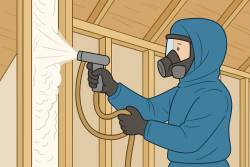Transforming your musty basement into a comfortable space isn’t the only reason to get it professionally insulated. Natural Resources Canada estimates that, on average, basements account for 20 percent of a home’s heat loss. In addition, proper insulation can help keep mould and water damage to a minimum. Here’s what you should know about basement insulation.
Basement insulation in Ontario
If you’re wondering whether you really need to insulate your basements walls, the answer is almost certainly that yes, you do. The 2012 International Residential Code requires insulation in all homes in Climate Zones 3 and higher. But even in warmer areas, basement insulation helps increase your home’s energy efficiency and can minimize the risks of moisture damage. This is especially important given Southern Ontario’s wet and humid climate.
Two ways to insulate
There are two ways to insulate a basement: either from the exterior or the interior of the structure. The right approach depends on a number of factors.
1. Exterior insulation
Here’s what you’ll get by insulating your basement from the exterior:
- Reduced heat loss and increased energy efficiency
- Less risk of moisture accumulation, mould growth and water damage
- Help to maintain uniform temperatures throughout the home
- More available interior space, which may be useful for those who want a finished basement
Exterior insulation is often built at the same time as the house, but it can be added to existing buildings. In both cases, it involves complex construction which is best left to professionals.
2. Interior insulation
Interior insulation has some advantages over exterior construction, including:
- Lower installation costs
- Decreased vulnerability to insect infestations and associated damage
- Provides the property owner with more options, as any type of insulation material can be used
Interior insulation is often a good option for existing structures. However, the right choice will depend on your specific needs, in addition to considerations such as your foundation’s condition and your geographical location. The best thing to do is to consult an expert.
Types of insulation
When choosing materials, it’s important to remember that basements have different requirements than rooms above ground. The fibreglass batting in your attic may not be suited to a basement where moisture and humidity are an issue. Spray foam insulation is an excellent choice for basements because it doesn’t absorb much moisture and can inhibit mould growth.
Ask the experts
For more information on basement insulation, visit us atReitzel Insulation. With over 46 years of industry experience, we’re Southern Ontario’s trusted source for residential and commercial insulation. Contact us today to learn more about our products and services or to request a free estimate.
.png)

















